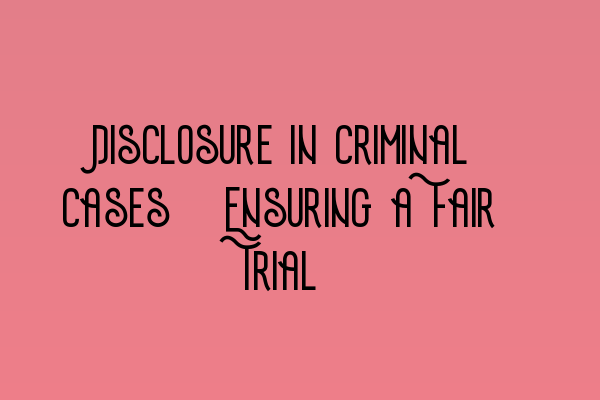Disclosure in Criminal Cases: Ensuring a Fair Trial
Welcome to our blog post on the topic of disclosure in criminal cases, where we delve into the importance of ensuring a fair trial through the proper disclosure of evidence. Disclosure plays a vital role in upholding the principles of justice, fairness, and transparency within the criminal justice system. In this article, we will explore what disclosure is, why it is crucial, and how it impacts the integrity of criminal proceedings.
What is Disclosure?
Disclosure refers to the process by which the prosecution shares relevant evidence with the defence in a criminal case. This evidence can include witness statements, forensic reports, CCTV footage, or any other material that may either support the prosecution’s case or undermine it. The purpose of disclosure is to ensure that both the prosecution and the defence have access to all the evidence necessary to present their respective cases and to enable a fair trial.
The Importance of Disclosure
Disclosure is essential to ensure a fair trial for the accused. It allows the defence to examine the evidence against them, identify any weaknesses or inconsistencies, and prepare their case accordingly. Without adequate disclosure, the defence would be at a significant disadvantage, unable to effectively challenge the prosecution’s evidence and potentially leading to miscarriages of justice.
In recent years, there have been highly publicized cases where inadequate disclosure has resulted in wrongful convictions and the erosion of trust in the criminal justice system. These cases have highlighted the need for robust disclosure practices to prevent the suppression or mishandling of evidence, which can have severe consequences for individuals and society as a whole.
Challenges and Solutions
Ensuring effective disclosure can be a complex task, with various challenges to overcome. Some of these challenges include the volume and complexity of evidence, the need to protect sensitive information, and the risk of delays in the disclosure process. However, it is crucial to address these challenges proactively to maintain the integrity of criminal proceedings.
One way to tackle these challenges is through the implementation of technological tools and systems that facilitate efficient disclosure processes. These tools can help streamline the management of evidence, ensure secure storage and sharing of information, and improve communication between the prosecution and the defence. Additionally, regular training and awareness programs for legal professionals involved in the disclosure process can contribute to better practices and adherence to disclosure obligations.
Conclusion
Disclosure is a fundamental aspect of criminal law and practice, serving as a cornerstone of the adversarial justice system. It is crucial to ensure that all relevant evidence is disclosed to the defence to enable a fair trial and maintain public confidence in the criminal justice system.
At SQE Criminal Law & Practice Law UK, we understand the significance of disclosure in criminal cases. We provide expert guidance and support to aspiring solicitors preparing for the SQE exams. If you are looking for SQE 1 or SQE 2 preparation courses or seeking SQE practice exams, we have you covered. Visit our website to find out more about our comprehensive SQE exam preparation courses and the latest SRA SQE exam dates.
Related Articles:
- SQE 1 Practice Exam Questions
- SQE 1 Practice Mocks FLK1 FLK2
- SQE 2 Preparation Courses
- SQE 1 Preparation Courses
- SRA SQE Exam Dates
